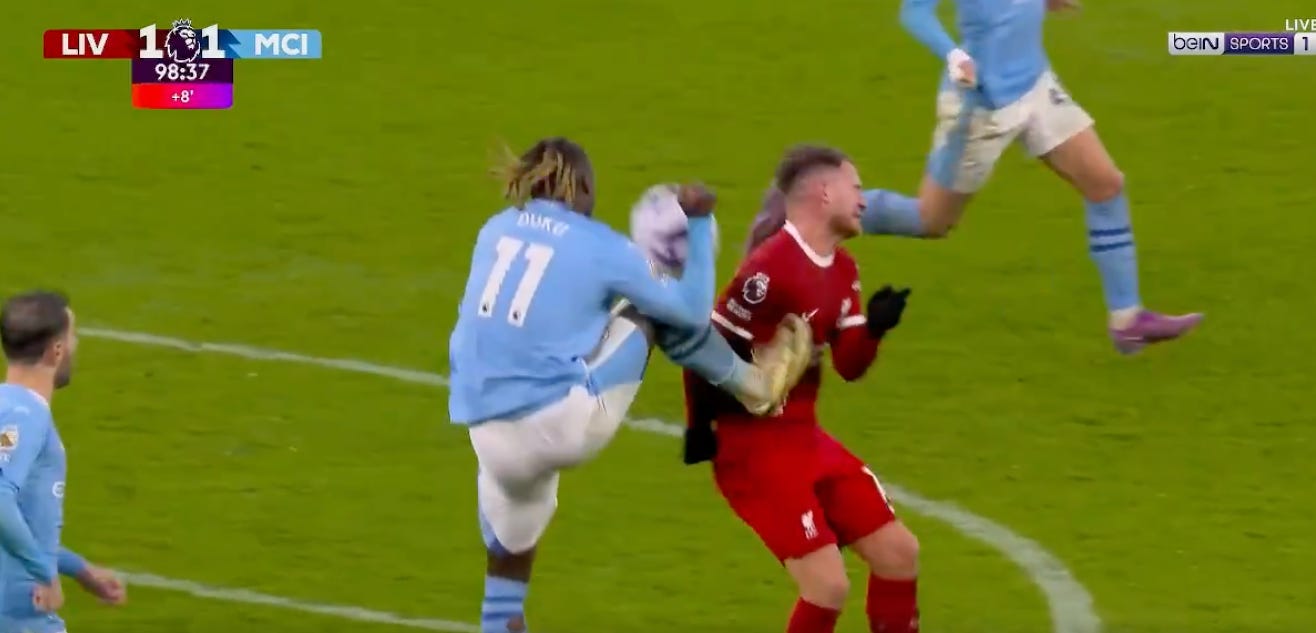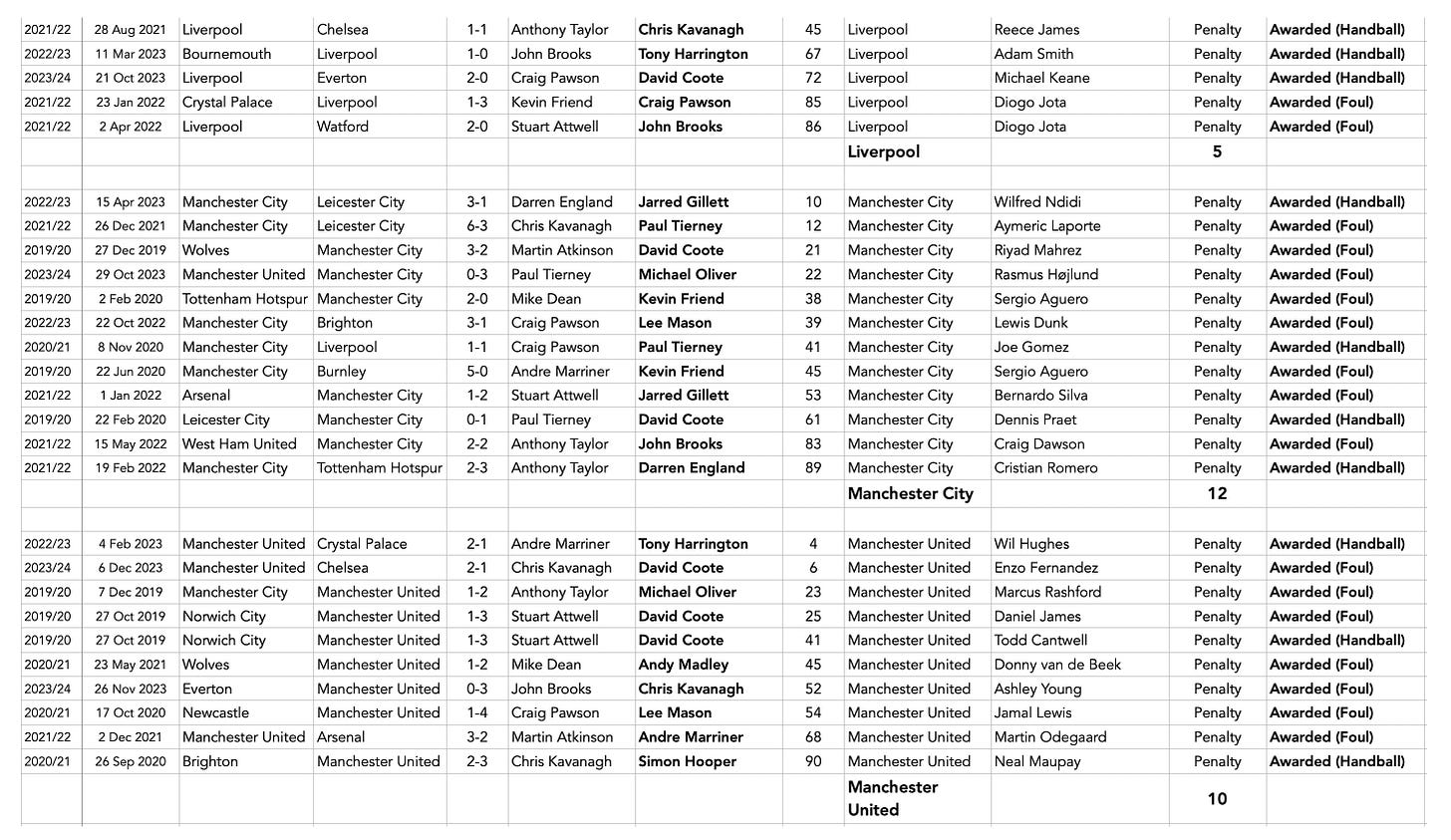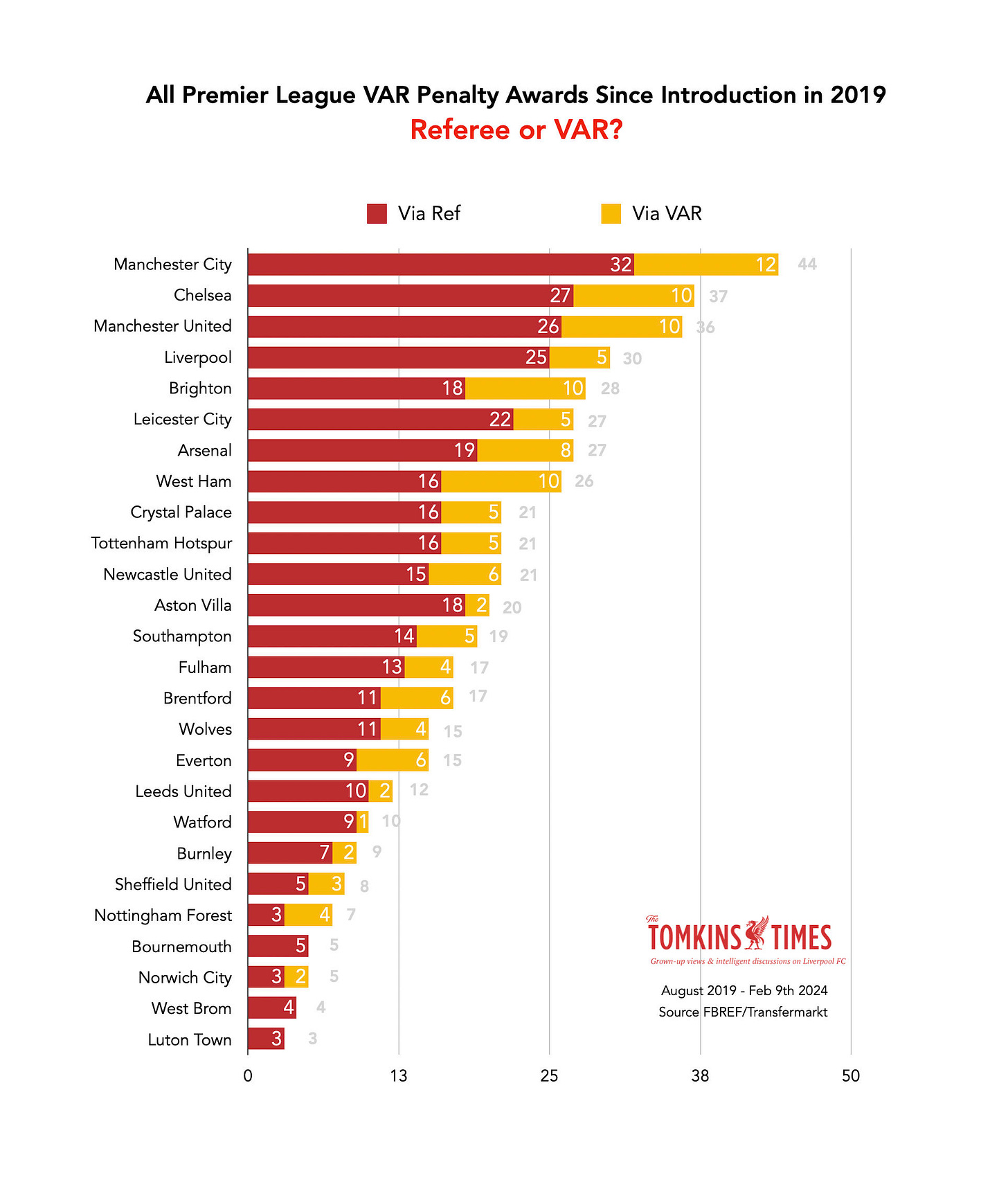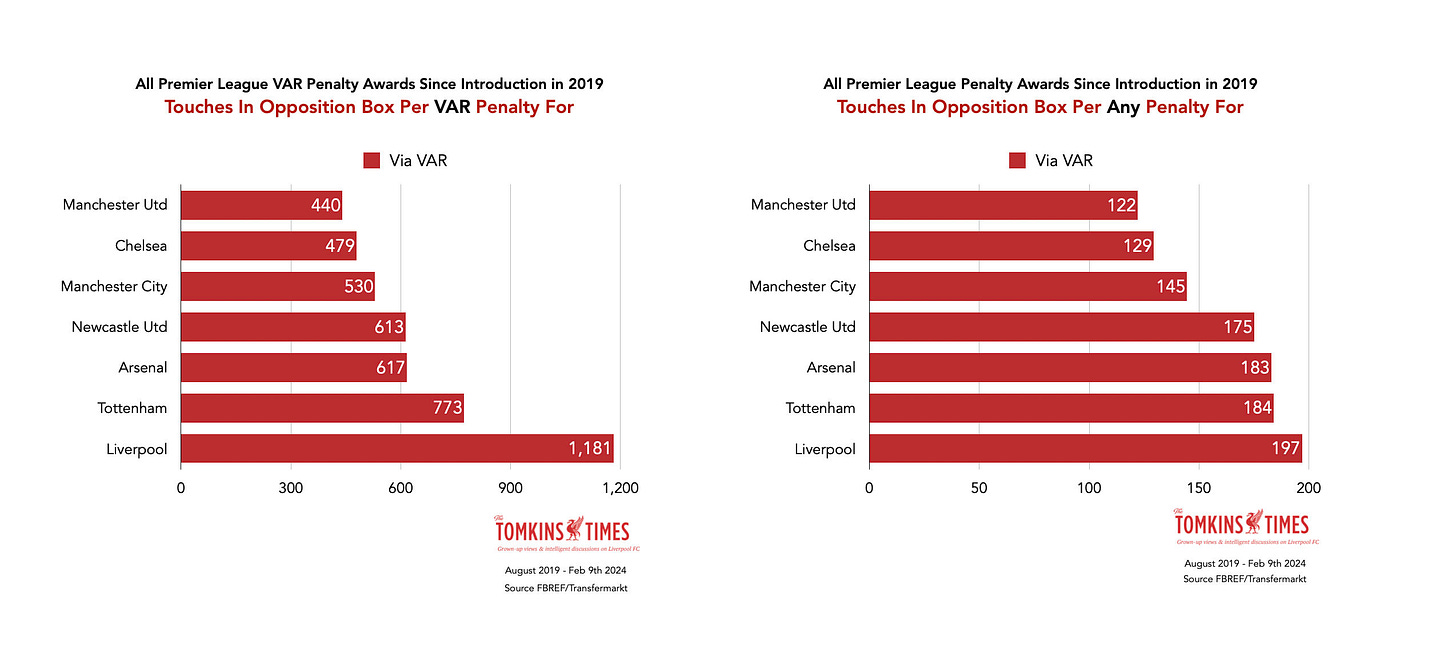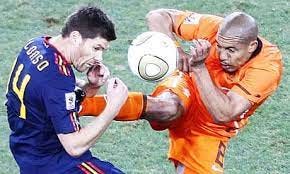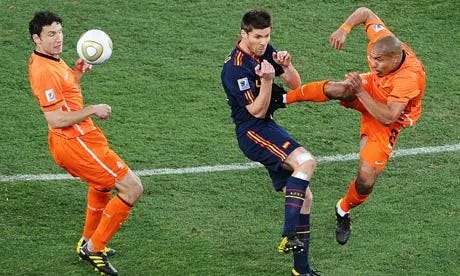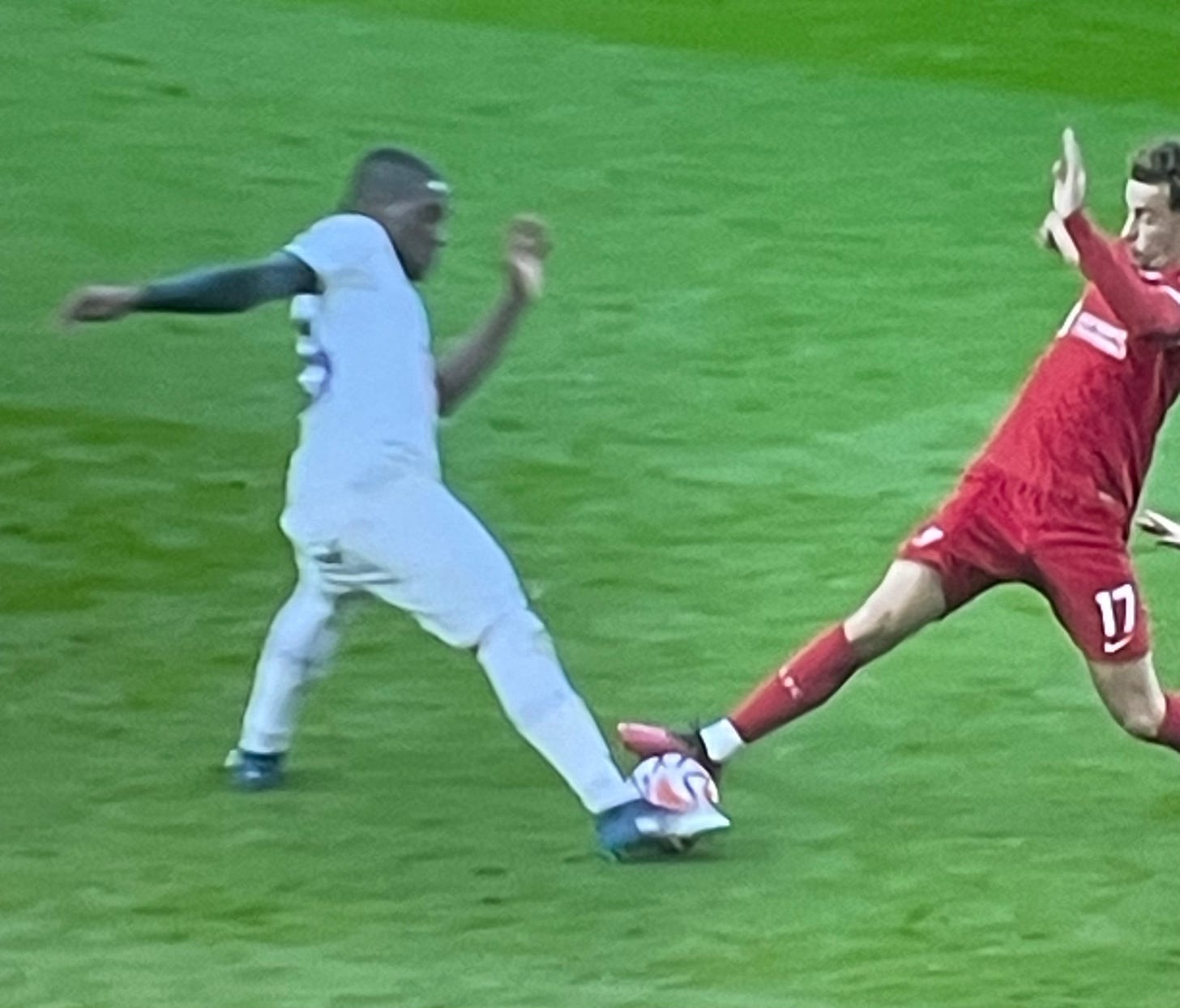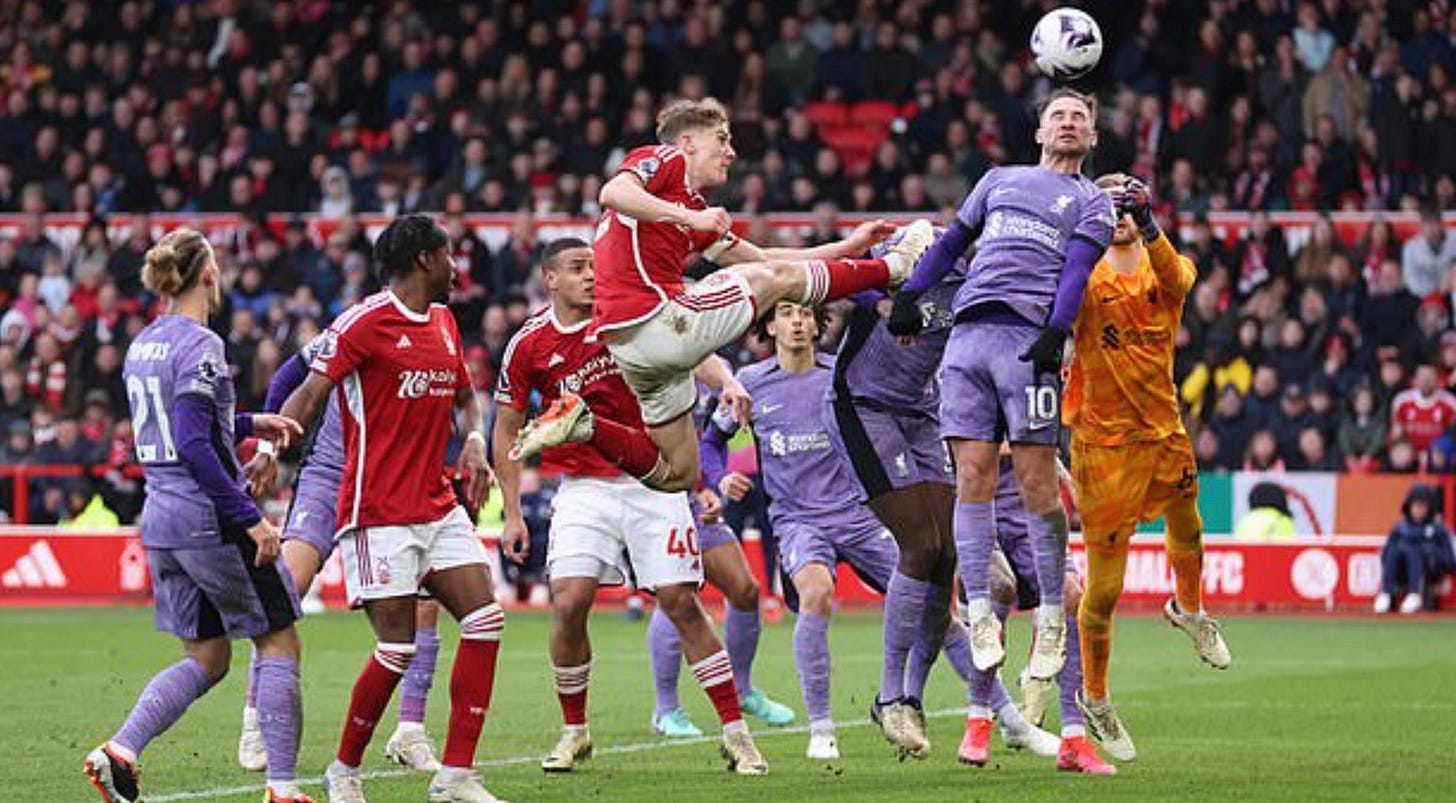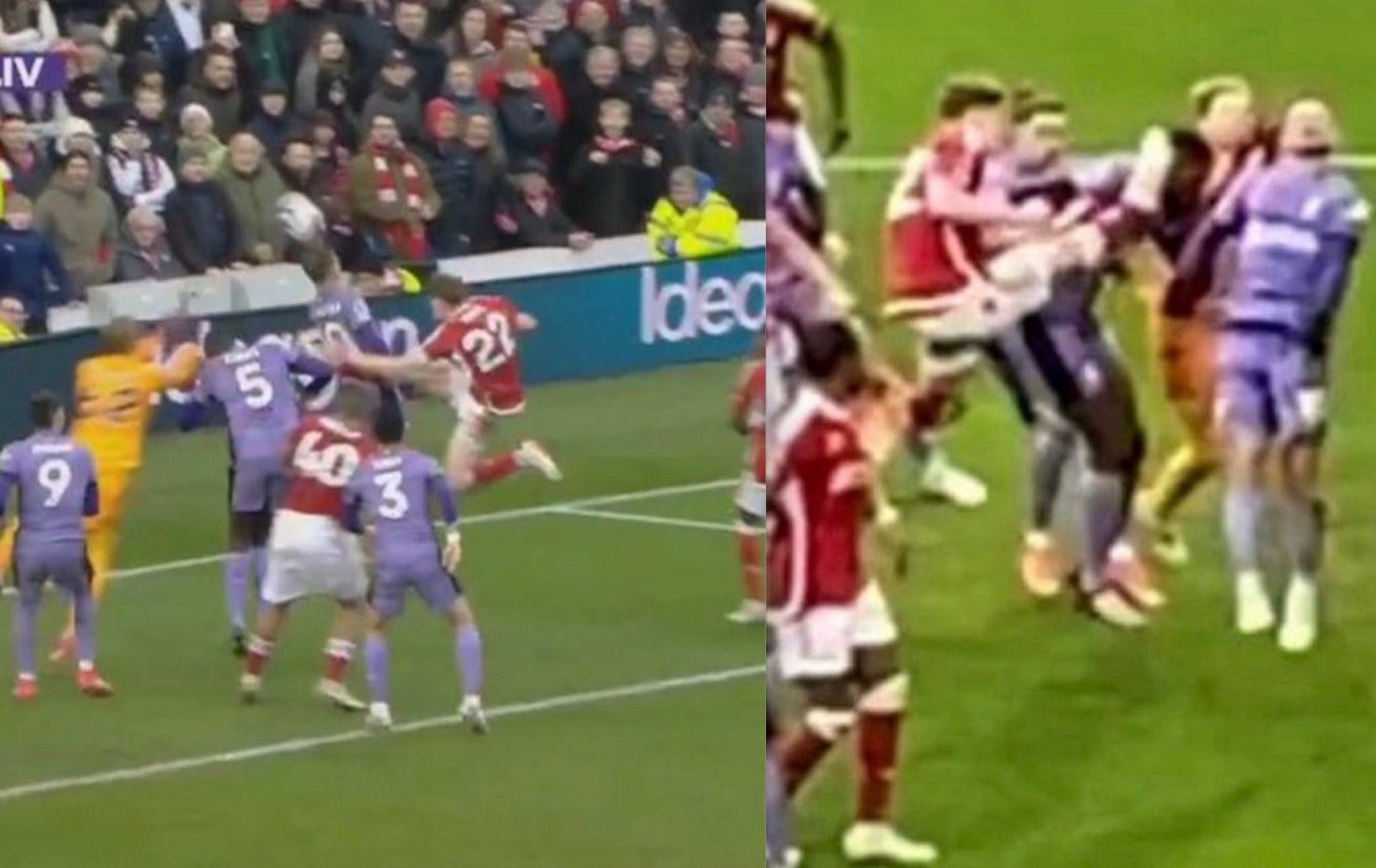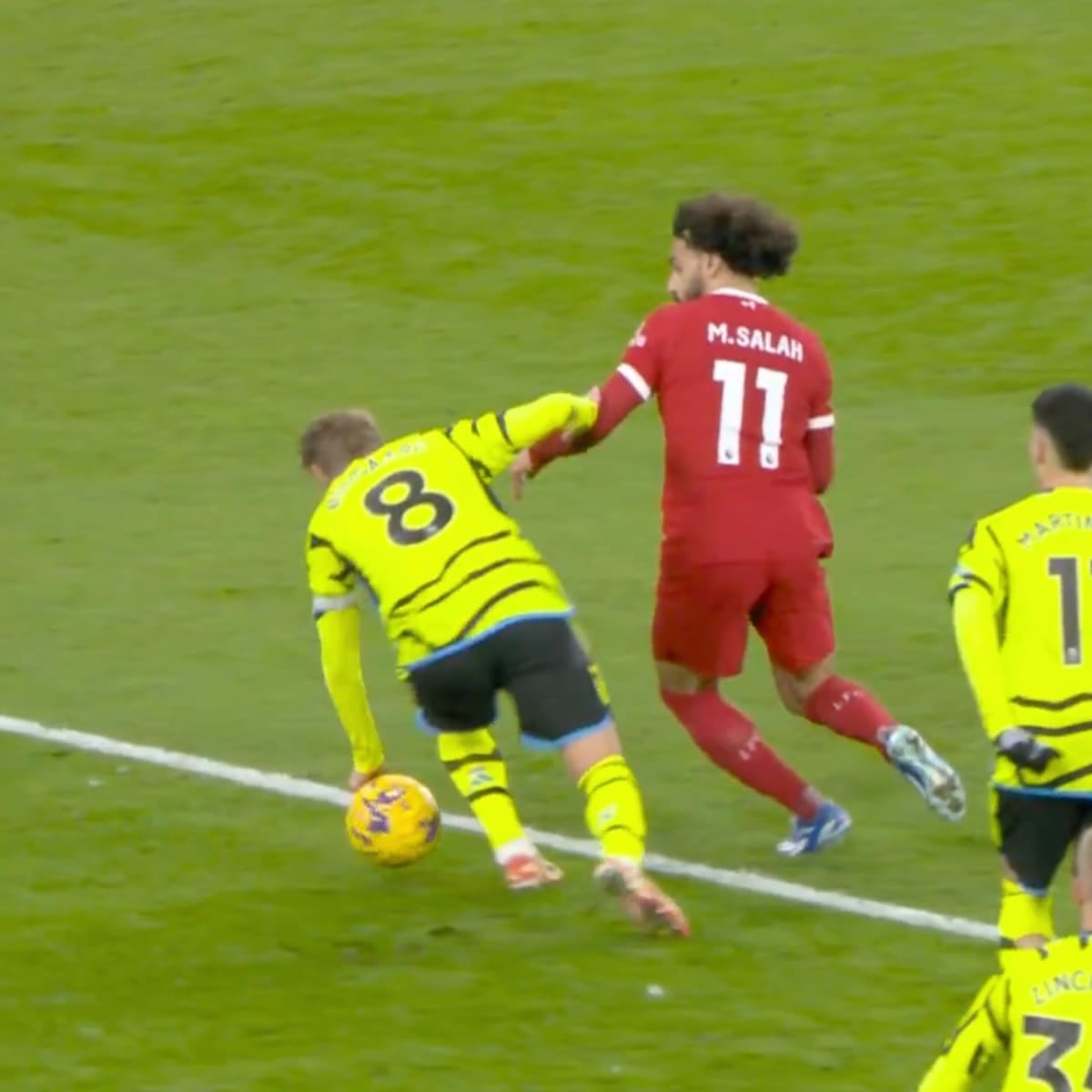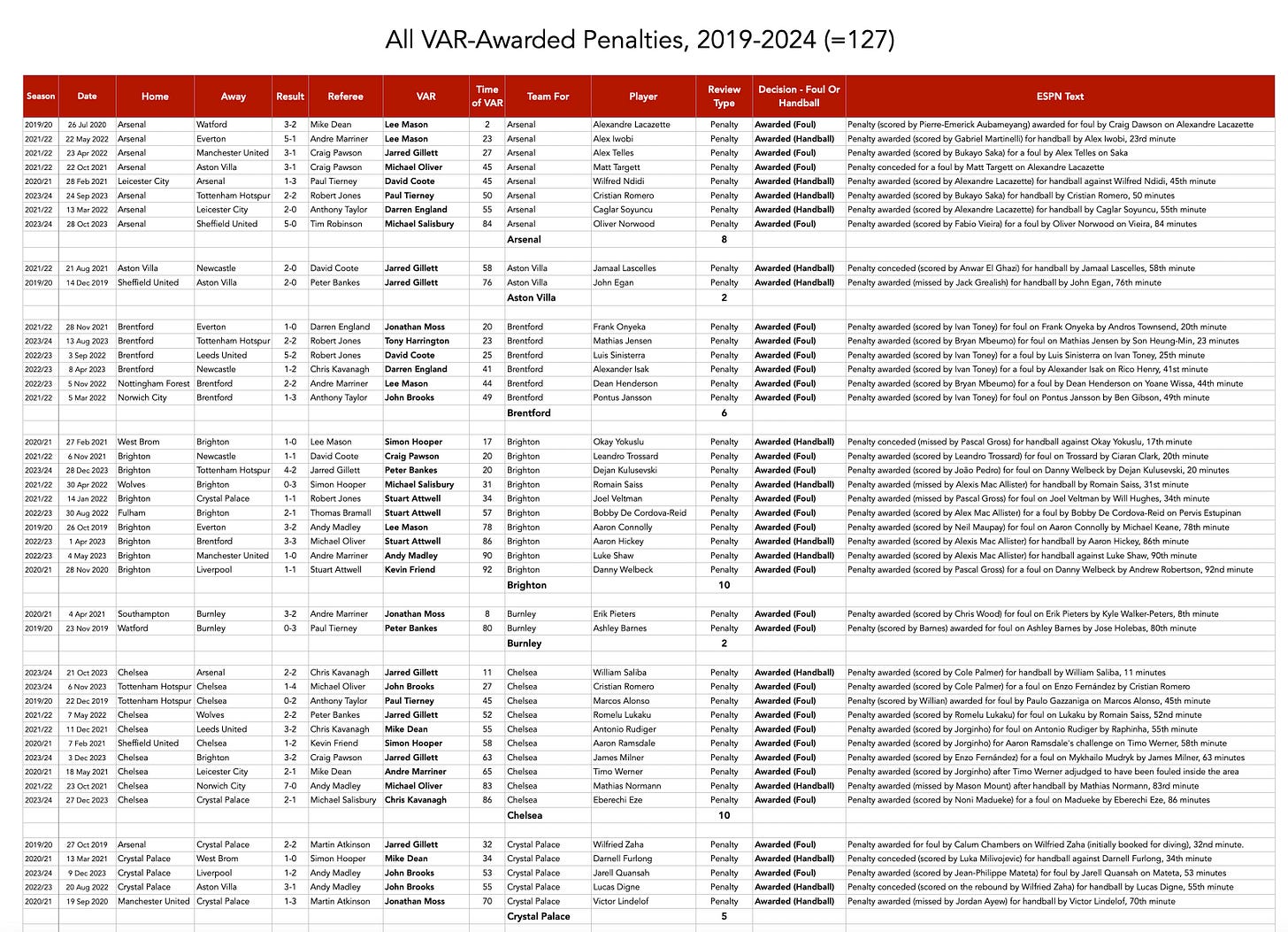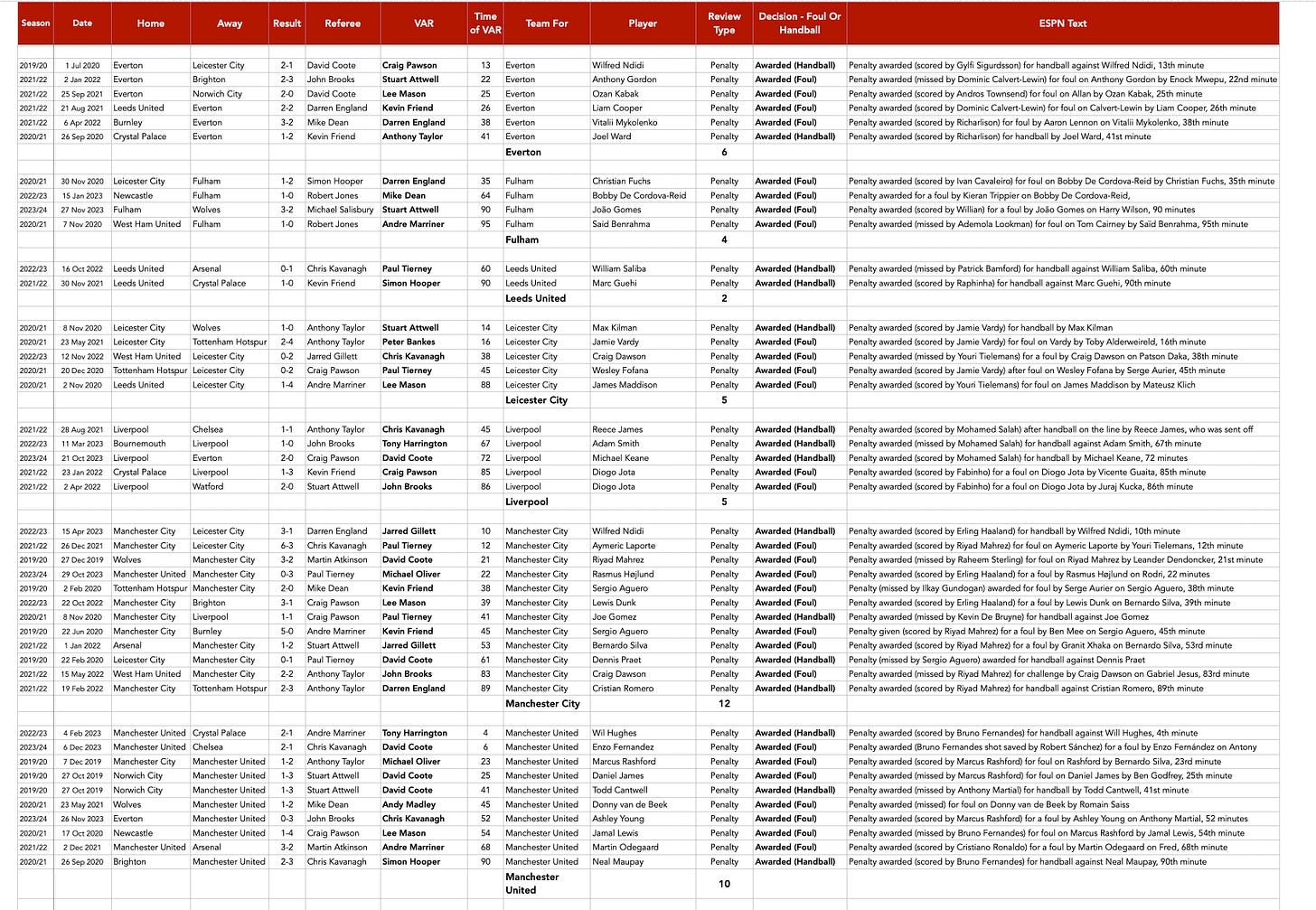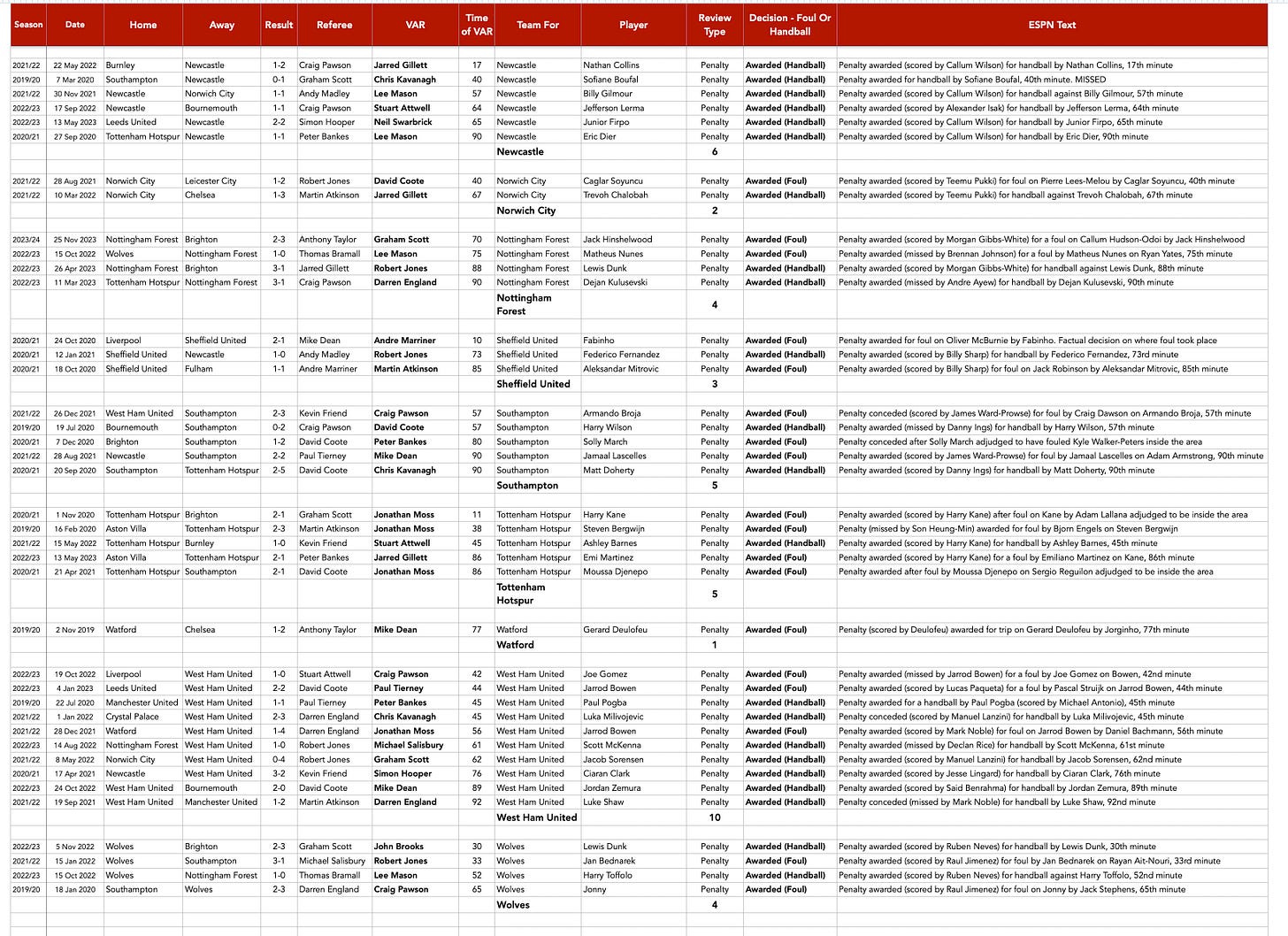Analysing Patterns in 800 Premier League penalties since 2016, Refs & VARs
FREE READ: Referees and VAR – which clubs get the calls, and which ones don't
Maybe it’s just coincidence (and coincidences do happen, sometimes), but before this past weekend, when I had undertaken a week of further research on databases I’ve been compiling for years, I had found the following patterns – some which, of course, then played out on Saturday and Sunday.
Liverpool’s data on almost everything still makes no logical sense.
Bournemouth get more early penalties than any other Premier League team (first 15 minutes), despite not always being in the top flight (several seasons in the Championship). This weekend? Penalty, 14th minute.
Man United ranked second for penalties in the first 15 minutes. Result this weekend? Penalty in the 12th minute.
Stuart Attwell never gives Liverpool penalties as a VAR (after what was then 25 games).
Nottingham Forest rank 2nd in the Premier League for VAR-awarded penalties per season. (It’s just not from Nuno Espírito Santo’s brief tenure.)
While this will focus mostly on the Reds, as that’s what the site is for, there’s lots of info here for fans of other clubs – some of it good, some of it bad.
It’s not always about what’s given; so often, it’s about what’s not given, and why.
But looking at what is given, Liverpool’s numbers since 2016 make no sense. Comparing to other clubs shows the quantity of the expected absent penalties, even if no generally well-matched teams will ever equal out as exactly the same.
EDIT: just to be clear, I’m not saying that other clubs should not have the number of penalties that they have, just wondering why Liverpool, via refs but more so via VAR, generally get fewer penalties despite only one club have better attacking metrics in the Jürgen Klopp era.
(My biases are clear, but the data should mostly speak for itself, even if my analysis may be skewed in a red direction.)
I’ll do a few bits of analysis, then share a bit more data later in the piece, for those who just want the numbers.
(Edit: As an afterthought, it strikes me that this is the key point: We all know that refs weigh up the calculus of “can I give this?” We see it every game. But what if it’s different for different teams? What if there are various reasons for those differences? And why would VAR make the issue worse, not better?)
Here’s one of the key takeaways for Liverpool fans, and perhaps the PGMOL:
*Of the 22 clubs to register at least one 90th-minute or later Premier League penalty since 2016, Liverpool rank last, at 22nd, on a per-season basis*
Liverpool also rank almost bottom for penalties in the early stages of games.
Liverpool are well behind many other clubs for overall penalties since 2016 in part as refs don’t seem comfortable awarding Liverpool either an early penalty or a late penalty, thus it’s a 70-minute period the Reds are dealing with, rather than the full game for everyone.
These are early and late penalties per season combined (Man United gained another early penalty at the weekend that is not included, and which would take them closer to Leeds at the top.)
Obviously Liverpool being about as dangerous an attacking force as Huddersfield makes a lot of sense, doesn’t it?
Not A Conspiracy
To be clear, I don’t think this is a conspiracy against Liverpool FC.
But, from the officials there’s a combination of factors that lead to a clear overreaction:
an unpopular manager with many of the refs and 4th officials who are also the VARs (so they end up having the same prejudices), some of whom clearly detest him (and I understand some of their dislike, from their perspective, but their job is to be above all that);
the general Anfield myths, as brought up before the game by Pep Guardiola to put pressure on the officials, and corrupt their thinking (it worked), when Manchester clubs tend to get about twice as many home penalties as Liverpool, in the Klopp era;
the mindset of the officials and how they go into games in what seems like battle mode, as seen by one of them assaulting a Liverpool player, of which not enough was made, in part as Andy Robertson didn’t milk it;
the whole provably incorrect ‘LiVARpool’ narrative that people still believe as fact, and perhaps officials do, too – or at least have to be seen to have it not be the case;
My study of 600+ 2011-2019 Premier League penalties showing a statistically significant favouritism to English players over overseas players in both boxes based on minutes played, and Liverpool’s attackers (and centre-backs/keepers) have almost all been overseas since 2016;
any complaint by Liverpool and their fans is met throughout England as “always the victims”;
and perhaps also that Scousers are foreigners, who boo the national anthem, and thus you get a general antipathy. (Everton don’t get a lot of help from refs either, albeit they’ve still had more VAR-awarded penalties than the Reds, and have still won more Anfield penalties in derbies than Liverpool of late.)
Rather than help, VAR seems to just be there to back up bad thinking.
Whereas I thought it would correct mistakes, it’s used to double-down; Mike “the ref’s right there the ref’s right there the ref’s right there” Dean was never more insightful than when he admitted – openly and honestly – that he spent his time as the VAR unable to overrule his good mates. He stood down as a result of feeling the pressure.
However, because this was an honest and uncomfortable assessment, he was forced to walk it back, lest we see how the sausage is made. (And some of the refs still look like they eat too many of the things, especially compared to the fitness of their European counterparts.)
The Premier League, Sky and TNT, all want us to believe the refereeing is trustworthy, which is why Sky didn’t really analyse the Luis Díaz debacle at Spurs at half-time, as if everyone had to get their stories straight. If we don’t trust the process, the sport is undermined, but it’s already starting to feel a bit like Formula One, on the way to WWE, in terms of outcomes needed to fit with ratings.
In five years, Liverpool have been awarded just five penalties by a VAR, three of which were for handball (two of them were to block goals on the line, one was to block a cross in between the defender and the goalkeeper within the six yard box; so even they had to be stonewall).
That means just two foul penalties called by a VAR for Liverpool in 180 games.
In five years, full of total Anfield domination, the like of which has rarely been seen at a home stadium over an extended period of time, Liverpool have been given …
… one single foul penalty by VAR. (April 2nd, 2022).
Addition: Meanwhile, Manchester clubs get at least twice as many VAR penalties overall, and get them from early in the game – two each inside the first 12 minutes – to late in the game. (As I will show, the two most common VARs for Liverpool games have never given Liverpool a penalty, despite over 20 games each as VARs and nearly 50 between them.)
And while refs have also obviously given penalties, Liverpool are 40% down on rivals Man City since 2016 when it comes to overall penalties, c.30% down on various others (Chelsea, Man United), and 10% down on some eternally mid-table clubs. The biggest shortfall, however, is in VAR penalties to Liverpool.
Result?
There was pretty much zero chance if Jeremy Doku had then stamped on Alexis Mac Allister’s head and, Luis Suarez style, bitten his shoulder, that a penalty would have been given.
If I were advising iffy betting syndicates (and I dislike betting), I’d say get your cash on an early Bournemouth, Man United, Man City or Brighton penalty, and don’t waste it on expecting one for Liverpool.
(Incidentally, virtually half of Stuart Attwell’s VAR penalties have been to Brighton, as an aside. Three of eight, but an actual half of his four foul penalties have been to the Seagulls. This was one where he called Michael Oliver to the monitor, for a handball.)
Once the clock hits 90, there’s almost zero chance of Liverpool getting a penalty, but plenty will go to Man United, Southampton (before they were demoted), Arsenal and Man City, as well as others.
(Data to follow later in the piece. The number of charts and graphs may truncate the email version of this article.)
For all their complaints, Nottingham Forest have as many Premier League penalties from the 90th minute onwards as Liverpool (since 2016), and they’ve only been in the top flight less than two seasons.
The sample size of 790 penalties across all Premier League teams is pretty huge.
You’ll still get weird anomalies that are just random, but obviously I don’t feel the patterns against Klopp’s Liverpool are random.
As I’m using various databases, I don’t yet have all the combined info for what I’d like to eventually do, which is to make sure every entry of every penalty has the ref, VAR, score when the penalty was given, home or away and the time of the penalty.
(Then I lose the will to live, and swear I’m done with all this crap, and then something happens that needs investigating.)
Almost all of this is available on Transfermarkt, which is my source for a lot of the data – but it does not have the VAR, and many lines of my penalty database has a media description of the incident too, and nationalities of the players involved, due to previous research undertaken.
Meanwhile, ESPN has a database listing and explaining every VAR decision, that is separate to the penalty descriptions in my database. Andrew Beasley has helped in compiling some of this VAR info. From this, Andrew provided me with the list of all VAR decisions, which could be sorted into objective (offside) and subjective (foul, handball).
As I already had so much penalty data, I chose not to look at red cards and second yellows for this, albeit Liverpool did go 310 games, over eight years, without an opponent being sent off for a second yellow, despite 10-20 occasions when it could/should have occurred.
But what I do have every detail for is the teams, who won the penalty, home or away, the final score, and the time of the penalty.
This, below, is what over 700 penalties look like, albeit I had to assign an average number to minute ’45’ as there almost 50 penalties awarded at what includes added minutes 46, 47, 48, etc. (all listed as 45 minutes instead, as you can’t imply they were in the second half), until the minute reverts to 46 for the first minute after half-time.
I’ve also done the same for penalties in the 90th minute, as again, 93 or 97 or even 101 minutes would be listed as 90th, and there is no consistent amount of added time – it varies massively from game to game, especially with more added than normal this season. (So I’ve done a separate analysis on minutes 90 minutes and beyond.)
As you can see, fewer penalties are awarded earlier in games (none ever until minute two). Maybe minutes one to five can be a case of getting up to speed, albeit that could also mean mistakes by defenders and goalkeepers who are not yet in the flow. The same seems to happen at half-time.
We all know, beyond doubt, that refs decide “hmm, too early to give that” – but no one checks how they apply it across the board. (Same as “if that’s outside the box it’s a clear foul”).
We know when referees ‘bottle’ decisions; when can sense it feels safer, or more convenient, to not give something. Just as an ignored clear foul inside the area would be given if outside the area.
(Doku would have been booked and a free-kick awarded.)
So much of refereeing is often about the path of least resistance, the path of least outrage. But it means they are not doing their job.
We accept the human element of this, but what are the patterns? And how does VAR help? Or does it make it worse?
If we look at objective VAR decisions below (offside goals disallowed or allowed by VAR), the first 20 minutes is very different. It is in line with the expected trend, not below it.
But on subjective VAR calls, we get the same pattern as with the refs.
Perhaps games take a time to get to the boil, but often they are broiling by minutes 80-90; yet the numbers drop off there, too, as if it too is too dangerous to give a late penalty. Liverpool are super-dangerous in added time, but they won’t get decisions in added time.
(And offside-goal-related VAR events occur at an expected frequency early in games, so why not subjective decisions with fouls and handballs in the box?)
It feels like, in general, refs are scared to give early penalties and later penalties. Alas, VARs just back them up.
However, when it comes to Liverpool, instead of lower quantities, it’s almost non-existent quantities.
Adding the two from this past weekend, these are the league penalties from minutes 0-14 in since 2016.
(Only Michael Oliver has awarded Liverpool a penalty inside the first 13 minutes of a league match in the past eight years.)
And if you analyse the timing and interventions of VAR, it just gets worse for Liverpool. VARs intervene far less in Liverpool games than for any other team, and the first half can be virtually written off.
Liverpool did very well from objective offside calls when VAR was first introduced, as the high line caught out opponents and assistant referees, which led to the hugely damaging ‘LiVARpool’ jibe, and maybe that’s why Liverpool don’t really get subjective calls at all.
LiVARpool became a narrative, and it takes strong people to go against narratives.
Of course Stuart Attwell would say, as he did, that “Doku played it [the ball] in a reasonable position”, when planting six studs into Alexis Mac Allister’s chest and then raking his studs on the thigh on the way down, as that’s motivated reasoning.
It’s a huge moment, in a huge game, and it requires the calm, detached, 200-miles-away analysis to say “that’s a penalty”, that you’d expect of a man with a spine earning hundreds of thousands of pounds to do a job.
But he can’t. He’s almost not allowed, as Liverpool are not reffed the same as other clubs, especially at Anfield, and this is a title-defining moment.
Perhaps he thinks “LiVARpool again if I give this?”
This is the data for ref-penalties and VAR-penalties since VAR was introduced (data up to early Feb.) Obviously refs have green-lit some of these, but if a VAR flags it, it feels 99% a done deal.
And these are the per-season VAR-awarded penalties:
While this is ref-penalties vs VAR-penalties related to opposition box touches, for the Big Six and Newcastle, which really highlights the VAR disparity, which grows even wider when it’s just foul penalties (not shown).
Same Old Story
Just as the clear handball by Rodri that robbed Liverpool of the 2021/22 title could simply not be given, and motivated reasoning, cognitive dissonance and maybe inattentional blindness (the inability to see what’s staring you in the face) either played a part or were used in some post hoc justification that we’re all sick off.
Chris Kavanagh, the VAR, and Paul Tierney, the ref, were never going to give it. Two Mancunian officials who were under tremendous pressure. Everton got an apology; Liverpool lost the title by a point.
Waist height is a high boot, by the way. Upper thigh is a high boot. Do that to someone’s groin, which in my biology and self-exploratory lessons, I discovered is below the chest, and it’s a yellow card and a foul.
While Liverpool have finally got a fair number of Anfield penalties in the last year, there should have been many more.
PGMOL head Howard Webb has a chequered history of high-boot errors, mind. That said, he did admit he should have seen of Nigel De Jong for this on Xabi Alonso (come home, Xabi!).
High boot, anyone?
Into the chest, anyone?
And remember, this was about a red card; the Doku one was deemed to not even be a foul. And this was 14 years ago, before we cracked down more on high boots.
Getting the ball?
Suddenly getting the ball matters, when half the time, it’s ignored. It’s selective reasoning. In truth, it should not matter.
Remember: Curtis Jones took the ball cleanly, and low on the ball; and still got sent off because his foot rolled up the side of the ball and bounced off the top of the ball into the player. It caught the player, and while that shouldn’t matter, we have here studs into the upper chest, and it’s still not deemed too high or dangerous play?
(Jones also got a three-match ban, plus missing the final 60 minutes of this match, for this tackle.)
Also, refs have to understand when a player is bottling a header and using a boot instead, which is very dangerous play. Especially in a crowded area. You have a responsibility to keep your foot down in the area. Intent or not, it’s dangerous, given the crowds of players. Doku bottled the header, and went with his foot.
The Jones decision cost Liverpool three points, more than the infamous disallowed onside goal that followed. Diogo Jota was then sent off for two non-fouls. You can’t win games with 10 men away from home against big clubs when 1-0 down and you certainly can’t with nine.
(As I’ve said before, I think Paul Tierney also remains the only VAR to not overturn an on-field error in the league this season, the red card shown to Mac Allister, that was overturned by the panel. It’s been a clusterfuck of a season for the Reds and officials, with five harsh red cards.)
One of the VAR Darren England’s biggest crimes that day was to lead with a misleading still frame, for the ref to be primed. As you can see above, Jones played and won the ball fairly. Why not show that?
Because you want to make it a red card.
Yet Attwell didn’t pick an image good or bad, as he didn’t summon Oliver at all.
In 26 Liverpool games as the VAR (the most common VAR Liverpool get, just ahead of Paul Tierney), Attwell has never given Liverpool a penalty, but as noted elsewhere, has given Brighton three when doing their games.
Tierney and Attwell seem to do way too many Liverpool games, and the other frequent VARs don’t give much to Liverpool.
Indeed, Tierney has given zero subjective calls to Liverpool in 22 games a VAR, but given calls against in games against Man United (home), Man United (away) and Man City (away).
Darren England and Simon Hooper, the duo from the Spurs game, are equally averse to giving anything to the Reds.
As with penalties in general, VARs don’t do anything for Liverpool early in the match. Whereas other clubs get early VAR penalties, Liverpool have not had a VAR penalty before the 45th minute of a match.
I can’t remember many refs being summoned to the monitors at Anfield to view a decision, albeit that’s just a case of what springs to mind. Also, checks for decisions that may favour Liverpool seem to be resolved quickly against them. (Maybe that part is just my perception.)
But on inattentional blindness, let’s go back a week, and no one even saw Ryan Yates.
No One Even Saw Ryan Yates
In all the weird fuss about drop balls (with Paul Tierney having dropped a ball to the Forest keeper earlier in the match), a Forest player did a flying karate kick into the vicinity of Ibou Konaté’s head and Mac Allister’s upper arm/back as the latter was off the ground.
I mean, just look at it.
It should have been a free-kick to Liverpool, and had Yates connected, a six-game ban, potentially.
I still find it the most remarkable thing I’ve seen on a football pitch in years, more so because it wasn’t mentioned anywhere. And more so still because of the fuss about a drop-ball two minutes before a goal.
He’s playing the ball, but in about the most reckless way I’ve possibly ever seen!
(Yesterday, Bernardo Silva, who had just escaped a yellow for ‘doing’ Mac Allister, was then booked for trying to take out Luis Díaz, but totally missed. It was still a yellow card, and rightly so.)
Different angles suggest Yates probably contacted Konaté’s shoulder, but that’s a red-card offence.
So in two games there have been two utterly reckless challenges on Liverpool players in the chaotic final moments.
And yet no one even saw Yates. One of the most insane attempts at a ball you’ll see, and no one saw it. It’s up there with Eric Cantona for kung-fu stylings. It is literally insane. If Darwin Núñez had done that he’d be banned for months.
If that connected with Konaté, Konaté would be in hospital. Do we need a player to go to hospital for something to be done? It’s a flying kung-fu kick with studs on the bottom of a boot.
Who was the VAR?
Stuart Attwell.
Again.
Attwell and his assistant – Constantine Hatzidakis, the man who elbowed Andy Robertson and who has a history of disallowing Liverpool goals – could apparently not see Yates on their giant hi-res video screens at Stockley Park.
To be kind, it’s inattentional blindness at its best (or worst), with no one seeing the giant gorilla in the room.
But we only have to go back to the last big game at Anfield to see another clear error, which the PGMOL fronted up to.
And while Liverpool have only had two foul penalties given by VARs, the total of three handball ones in five years is also very low.
The VAR could see the slip, but not the panicked pulling of the ball out of the way of Mo Salah, to cover for the slip. That’s either motivated reasoning, a lack of understanding of football, or some other cognitive dissonance.
All six of Newcastle’s VAR penalties have been handballs (and they’ve only been a good attacking side for less than two years), weirdly, and many clubs have four or more.
West Ham have seven handball penalties. More than twice the number Liverpool have had. And ten VAR penalties to Liverpool’s five.
Clearly West Ham must have been a sensational attacking team in the last eight years, mostly under David Moyes.
As with Crystal Palace having more penalties than Liverpool since the start of 2016 (and Leicester have more per-season, as do various others), West Ham have done brilliantly from VAR. Brentford do extremely well with the officials.
*So the notion that smaller clubs get nothing is clearly not true*
But there’s a pattern this season in big games for Liverpool. The Spurs debacle, with two soft red cards. The sending off of Virgil van Dijk for what was not a clear goalscoring opportunity compared to most such awards. Konaté sent off at Arsenal. And the handball in the reverse fixture. (The one positive decision was the disallowing of Man City’s goal at the Etihad for a foul on Alisson, of the kind which are usually given as fouls.)
Again, Anfield, fairly early in a game. Fairly early in a big game. Fairly early in a vital game.
For all the talk about Paul Tierney doing Liverpool a favour last week, Tierney, has never given Liverpool a Big Decision as a VAR; or, as a ref, to Liverpool away from Anfield – and he’s now past 50 games either ref or VAR in Reds’ games.
(The one red card to his ‘name’ was one where he gave a yellow in 2020 away at Chelsea, and the VAR, Michael Oliver, correctly upgraded it to a red, as it was clearly a last-man foul. I don’t blame Tierney too much for this as he was miles behind play on a quick breakaway, but equally, I cannot credit him with the sending off – as he didn’t make the decision.)
Attwell has never given Liverpool a VAR penalty. Full-stop.
David Coote has given one, but missed the handball above, and famously missed the foul by Jordan Pickford on Virgil van Dijk that could have ended the latter’s career. His reward? Do the VAR role in the game at Arsenal, where Liverpool lost and had a man sent off.
There’s so much to look into, and yet I feel like I’ve barely covered half of it.
Some of the results may just be the result of randomness, but there’s too much for it not to also be some kind of (perhaps unspoken) agenda, based on dislike of Klopp and ideas about Liverpool getting too many decisions, via VAR and via penalties, and at Anfield, when none of them are true.
In the old days, officials bowed to the pressure of the crowd. Now they bow to the Sky viewers and to social media.
My most recent big refereeing study can be found here, albeit I keep swearing myself off this, until the situation becomes untenable again. Once you know the data, and can spot the patterns, it’s hard to not see these things – and harder to write them off as “one-offs” when they’re not.
I apologise in advance for an errors, omissions and typos. The data is correct as to the best of my knowledge.
The Data
What follows below are a few tables and lists. I won’t add any further commentary. (Clicking the image should enlarge it.)
At some point I will complete and share the full 800-or-so penalty database to include as many fields as possible, to see which refs and VARs are early or late bottlers, etc., and any other patterns.
Commenting is for paying subscribers only.
Keep reading with a 7-day free trial
Subscribe to The Tomkins Times - Main Hub to keep reading this post and get 7 days of free access to the full post archives.


